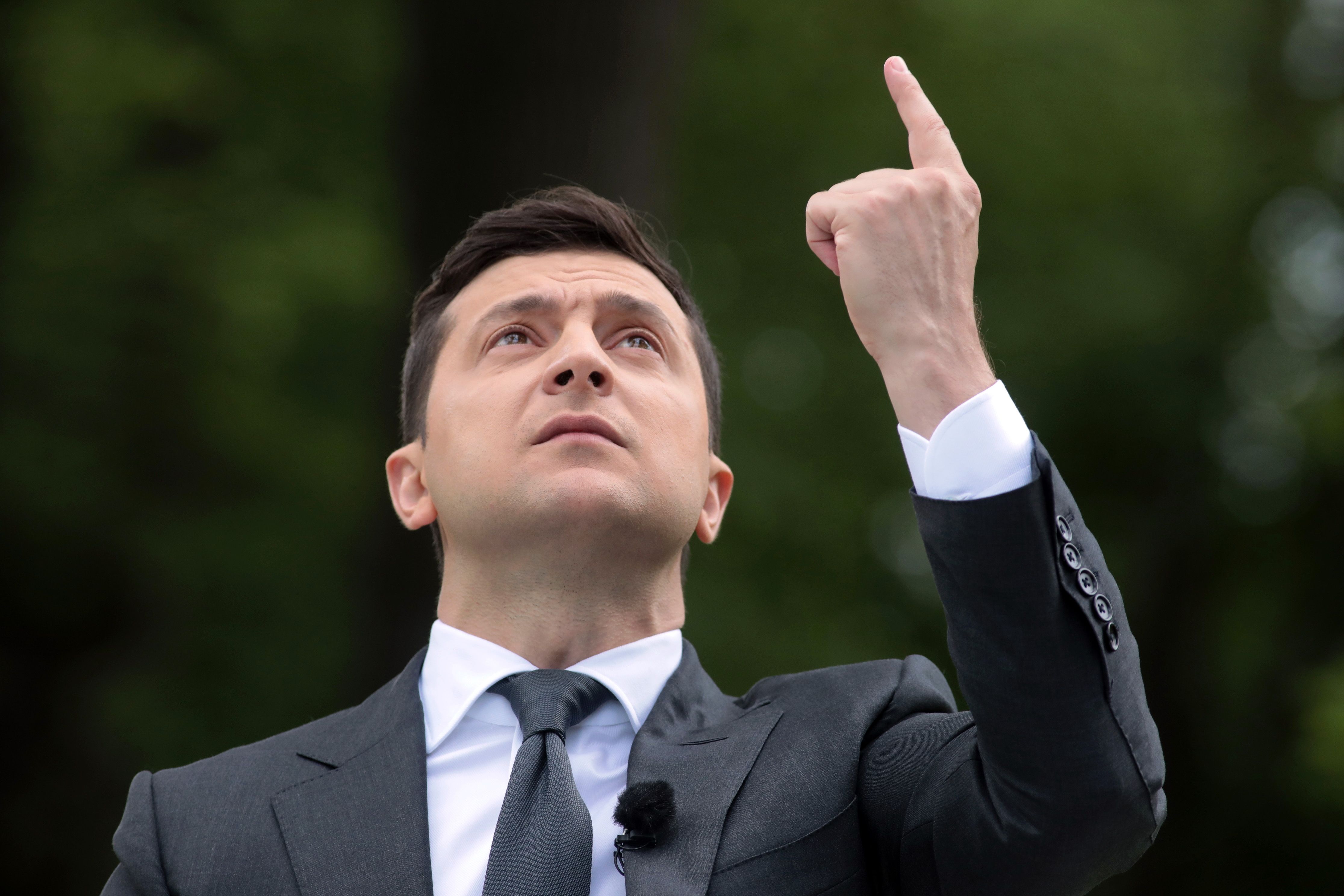Ukraine’s Foreign Policy in President Zelensky’s First Year

Policy Towards Russia
As announced during his election campaign, Zelensky in his first year as president has prioritised resolving the situation in Donbas. The president has intensified negotiations with Russia, including at the bilateral level. Ukraine’s stance has remained unchanged regarding the restoration of full control over the border with Russia and the withdrawal of Russian forces as conditions for holding local elections in Donbas. On the other hand, by way of concessions, Ukraine agreed to the so-called Steinmeier formula, which assumes that a special status for Donbas would begin to function on the day of local elections. Although the Ukrainian compromises opened the way for the reactivation of talks at the highest level in the Normandy Format (France, Germany, Russia, Ukraine) in Paris in December 2019, the negotiations did not result in a breakthrough due to the lack of political will among the Russian authorities. There was no lasting ceasefire or exchange of prisoners of war in an “all for all” formula (in total, more than 300 people were exchanged in three rounds). The release of prisoners was assessed by Ukrainians as a success of Zelensky’s presidency to date (81% positive), but the concessions to Russia remain a subject of public criticism.
European and Euro-Atlantic Policy
Integration with NATO and the EU remains one of the main objectives of Ukrainian foreign policy. Symbolic confirmation of Zelensky’s pro-western course was his first visit as president to Brussels, during which he met with the leaders of both organisations. In June 2020, Ukraine was approved for NATO’s Enhanced Opportunities Partnership (EOP) programme, which President Poroshenko had also applied for. Membership in the EOP enables Ukraine to deepen cooperation with NATO in terms of planning, exercises, and information exchange. However, it does not open the way to membership in the Alliance. Zelensky, like his predecessor, puts great emphasis on strengthening the country’s defence capabilities in the Black Sea Basin (e.g., through exercises with troops from NATO countries). Ultimately, Ukraine’s intention remains to achieve membership in the Alliance.
The previous government intended to meet the conditions for EU membership by 2024 by, among other things, implementing the provisions of the Association Agreement (the new government programme hasn’t been approved by parliament). Until then, Ukraine’s EU policy is to focus on sectoral integration, especially in the energy and digital markets. The Ukrainian authorities see the Eastern Partnership as an initiative to facilitate the country’s integration into the EU internal market. In 2021, Ukraine intends to renegotiate the conditions for trade cooperation with the Union—it would like to increase import quotas and reduce duties on Ukrainian goods entering the EU. Ukraine is also continuing its efforts, initiated by Poroshenko, to sign the Agreement on Conformity Assessment and Acceptance of Industrial Products (ACAA) with the Union, which would allow Ukrainian industrial goods to enter the EU market under intra-EU conditions. In May, EU Commissioner for Neighbourhood and Enlargement Olivér Várhelyi confirmed that the EU is ready to accelerate discussions on the ACAA.
Relations with the U.S. remain crucial for Ukraine because of the former’s diplomatic, financial, and military support. During Zelensky’s presidency, bilateral relations have been dominated by the impeachment of Donald Trump. This negatively affected the U.S. president’s opinion of Ukraine and cast aside the prospect of granting it the status of a major non-NATO ally. Nevertheless, cross-party consensus in the U.S. on the need to support Ukraine was maintained, as demonstrated by the Congressional approval for another tranche of military aid for Ukraine—$300 million for 2020. The U.S. has also maintained sanctions on Russian entities.
Foreign Policy Diversification
Zelensky puts more emphasis on economic diplomacy than his predecessor, seeking an influx of foreign investment into Ukraine. During his foreign visits, the president regularly meets with business representatives. What is more, in October 2019, on his initiative, an investment forum was organised in Mariupol. Zelensky also continues activities initiated by Poroshenko: in August 2019, Ukraine signed a free trade area agreement with Israel and continues negotiations on the conclusion of similar agreements with Turkey and the United Kingdom, and on the extension of the free trade agreement with Canada. The new foreign minister, Dmytro Kuleba, appointed in March, announced Ukraine’s intention to strengthen trade relations with Asian countries. The emphasis on economic diplomacy has so far not brought tangible results in the form of greater interest of foreign investors in Ukraine, mainly because of the country’s internal problems (e.g., high level of corruption).
Zelensky has followed through on declarations and taken steps to improve relations with Ukraine’s neighbours. In October 2019, the country consented to resume the search for and exhumation of Polish victims of 20th century conflicts on its territory, which improved the atmosphere in relations with Poland. At the same time, Ukraine started to adapt its laws on education and minorities to the recommendations of the Venice Commission, especially concerning teaching languages. This has resulted in a reduction of tensions in relations with Hungary, which is reflected in the resumption of the bilateral dialogue with Ukraine (including at the ministerial level) on, among other things, the unblocking by Hungary of the works of the NATO-Ukraine Commission.
The current Ukrainian leadership, like the previous authorities, express interest in regional cooperation with neighbouring countries, especially Poland, for example, on the construction of the Via Carpatia route, the E40 waterway (to connect the Black and Baltic seas), and in LNG imports from the U.S. through Poland. In August 2019, Ukraine signed a tripartite memorandum with Poland and the U.S. concerning energy cooperation. However, the Ukrainian authorities consider the project of a Ukraine-EU Energy Bridge, lobbied for by their predecessors during Poroshenko’s presidency, to be off the table.
Perspectives
Despite the lack of progress in negotiations with Russia on the situation in Donbas, resolving the conflict will remain a priority of Ukrainian foreign policy. Ukraine will continue bilateral talks with Russia, as well as those under the Normandy Format and the Trilateral Contact Group in Minsk. If these formats prove to be ineffective, it will seek new ones, possibly with the participation of the U.S. Zelensky will try to achieve further short-term successes (e.g., exchange of prisoners), but it is unlikely that he will agree to the Russian conditions for the Donbas elections, insisting on the withdrawal of Russian troops and full control of the Ukrainian border with Russia. For this reason, the Russian authorities will probably try to halt the negotiations while shifting the blame for “sabotaging” the Minsk agreements to the Ukrainian authorities.
Ukraine will continue its policy of integration with NATO and the EU. In the short to medium term, however, due to the economic effects of the COVID-19 pandemic, the pace of Ukraine's implementation of the provisions of the Association Agreement and sectoral integration with the EU may slow down. This may result in postponing talks on the renegotiation of the terms of trade cooperation with the EU and the conclusion of the ACAA, as well as limit Ukraine’s participation in NATO and EU initiatives (e.g., NATO exercises, EU Green Deal). The pandemic-induced economic crisis in Ukraine also may prevent the country from implementing infrastructure and energy projects with its neighbours, including Poland.


